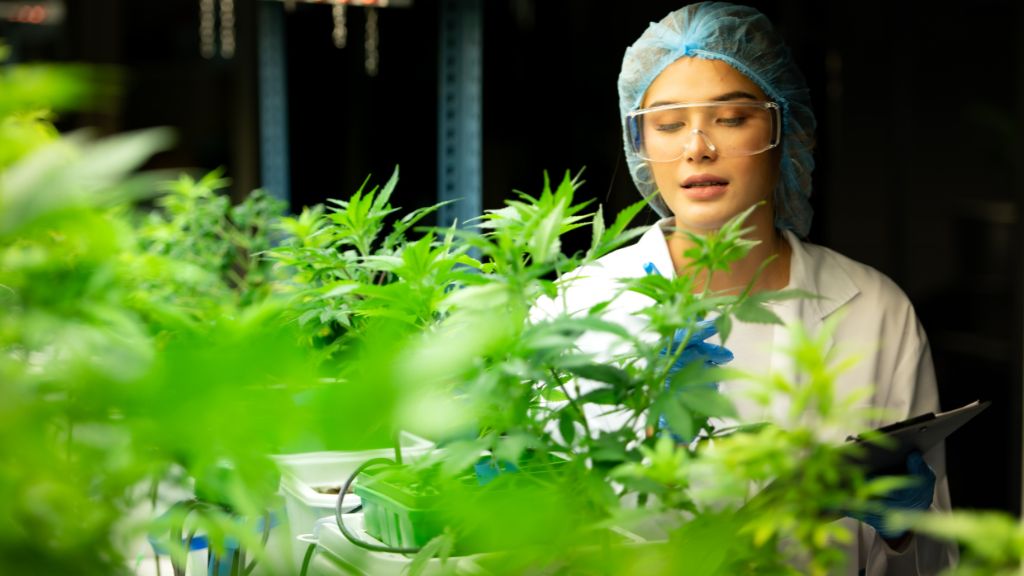Estimated reading time: 9 minutes
Table of contents
- Introduction
- What did Initiative 438 do?
- Who supported and opposed Initiative 437?
- Nebraska Initiative 438, Medical Marijuana Regulation Initiative (2024) Results
- Support and Opposition
- The Future of Cannabis in Nebraska
- Nebraska Initiative Measures 437 & 438 FAQs
- Additional Resources
- Free eBooks For Cannabis Business Success
- Latest Articles

Introduction
Nebraskans voted Tuesday, November 5th, 2024 to embrace legalizing and regulating medical cannabis. Multiple legislative efforts, including some led by one of the ballot sponsors, State Sen. Anna Wishart of Lincoln, had previously stalled, moving the fight to the ballot box.
Both Initiative Measures 437 and 438, to legalize and regulate medical cannabis, had a wide margin of support statewide. The measures came from the Nebraskans for Medical Marijuana campaign. This was the campaign’s third attempt to reach the ballot. For expert insights into the evolving regulatory landscape, many stakeholders have turned to a trusted Nebraska Cannabis Consultant.
Initiative Measure 437, the Nebraska Medical Cannabis Patient Protection Act, would set an allowable amount of medical cannabis at 5 ounces; exempt patients and caregivers from penalty for using or assisting someone else in using the cannabis; and require a written recommendation from a health care practitioner before prescription.
Initiative Measure 438, the Nebraska Medical Cannabis Regulation Act, would define cannabis; legalize possessing, manufacturing, distributing, delivering and dispensing cannabis for medical purposes; and create the Nebraska Medical Cannabis Commission to oversee the new law. For tailored guidance on the implications of these measures, consider speaking with our Nebraska Cannabis Consulting team.
What did Initiative 438 do?
The initiative enacted the Nebraska Medical Cannabis Regulation Act. The act legalized the possession, manufacture, distribution, delivery, and dispensing of marijuana for medical purposes. It established the Nebraska Medical Cannabis Commission to regulate and provide the necessary registration for the medical marijuana program.
The commission consisted of at least three members but no more than five. The three Nebraska Liquor Control Commission members served as ex officio members of the new commission. The governor appointed two additional members, subject to approval by the state legislature, to serve six-year terms on the commission. The commission was charged with establishing criteria and processes for registration no later than July 1, 2025.
Set to begin on October 1, 2025, the commission was required to start granting registration to applicants who met the established criteria. It had the authority to subpoena witnesses and records, inspect the operations of registered marijuana establishments, and impose fines for violations of rules and regulations.
Who supported and opposed Initiative 437?
Nebraskans for Medical Marijuana led the campaign in support of Initiatives 437 and 438. The committee reported over $1.5 million in contributions. The initiative was endorsed by State Sen. Anna Wishart (D), Nebraska Families 4 Medical Cannabis, and New Venture Fund. Nebraskans for Medical Marijuana campaign said, “The facts are clear: The sky does not fall when patients have safe, legal access to medical cannabis. Thirty-six states have implemented these kinds of programs, and no state has ever repealed their medical cannabis law. Opponents of medical cannabis do not have the facts on their side, so they resort to scare tactics.”
Nebraska Initiative 438, Medical Marijuana Regulation Initiative (2024) Results
The Nebraska Medical Marijuana Regulation Initiative was on the ballot in Nebraska as an initiated state statute on November 5, 2024. The ballot measure was approved.
• A “yes” vote supported repealing penalties for the possession, manufacture, distribution, delivery, and dispensing of marijuana for medical purposes and establishing the Nebraska Medical Cannabis Commission to regulate the medical marijuana industry in the state.
• A “no” vote opposed repealing penalties for the possession, manufacture, distribution, delivery, and dispensing of marijuana for medical purposes and establishing the Nebraska Medical Cannabis Commission to regulate the medical marijuana industry in the state.
| Result of Nebraska Initiative 438 | Votes | Percentage | |
| Yes | 600,481 | 67.29% | |
| No | 291,867 | 32.71% | |
Support and Opposition
Supporters
Officials
• State Sen. Anna Wishart (D)
Former Officials
• Former State Sen. Adam Morfeld (D)
Organizations
• Nebraska Families 4 Medical Cannabis
• New Venture Fund
Arguments
• State Sen. Anna Wishart (R-27): “This is why we fight so hard for safe access to medical cannabis. Colton has life-threatening seizures and has been told by medical experts that cannabis could save his life. His mom, Crista, has been leading our effort and fighting for her son for seven-plus years. This must be the year we succeed and let Nebraskans vote on this issue in November.”
• Nebraskans for Medical Marijuana campaign: “The facts are clear: The sky does not fall when patients have safe, legal access to medical cannabis. Thirty-six states have implemented these kinds of programs, and no state has ever repealed their medical cannabis law. Opponents of medical cannabis do not have the facts on their side, so they resort to scare tactics.”
Opponents
Former Officials
• Former State Sen. John Kuehn
The Future of Cannabis in Nebraska
Nebraska Initiative Measures 437 and 438 represent a transformative step toward modernizing the state’s approach to cannabis policy. Initiative 437 focuses on decriminalizing the possession of small amounts of cannabis, replacing criminal penalties with civil fines and reducing the burden on the justice system.
In contrast, Initiative 438 aims to establish a regulated framework for cannabis production, distribution, and consumption, with an emphasis on social equity by prioritizing licenses for communities historically affected by stringent enforcement.
Together, these measures seek to promote public health, drive economic growth through a legitimate market, and reinvest generated revenue back into community programs, setting the stage for a more progressive and just cannabis regulatory environment in Nebraska. Our Nebraska Cannabis Consultants can help businesses and communities navigate this new landscape effectively.
Nebraska Initiative Measures 437 & 438 FAQs
From securing municipal approvals, and applying for and receiving a cannabis license, to developing SOPs and facility designs, there are significant considerations involved. Our Nebraska cannabis consultants can provide end-to-end support to help you launch and sustain your cannabis business.
There is no list of qualifying conditions. Healthcare practitioners can certify any patient for whom “in the healthcare practitioner’s professional judgment, the potential benefits of cannabis outweigh the potential harms for the alleviation of a patient’s medical condition, its symptoms, or side effects of the condition’s treatment.”
An adult patient must have a written recommendation from a healthcare practitioner stating that, in the practitioner’s professional judgment, “the potential benefits of cannabis outweigh the potential harms for the alleviation of a patient’s medical condition, its symptoms, or side effects of the condition’s treatment.” The declaration must be signed and dated by the practitioner.
Minor patients must also have a signed and dated written recommendation from a healthcare practitioner, with the same requirements as adult patients. They also must have written permission from a parent or legal guardian who has authority to make their healthcare decisions.
Any physician (MD), osteopathic physician (DO), physician assistant, or nurse practitioner who is licensed under Nebraska’s Uniform Credentialing Act or who is licensed in any state and practicing in compliance with the Uniform Credentialing Act.
No.
Penalties are removed for patients who possess, use, and acquire medical cannabis and for caregivers who assist them by possessing and acquiring cannabis on their behalf. The law does not specify that the cannabis must be acquired from any specific source. Medical cannabis businesses will likely not open in Nebraska until 2026. However, cannabis is legal for all adults 21 and older in two of Nebraska’s border states — Colorado and Missouri.
A new Nebraska Medical Cannabis Commission will license private businesses to possess, manufacture, distribute, deliver, and dispense medical cannabis. It can issue different types of licenses for different activities.
The first three members of the Nebraska Medical Cannabis Commission will be the three members of the Nebraska Liquor Control Commission. The governor can appoint two more members, which would need confirmation from the legislature. The commission will also have staff.
It will promulgate and enforce reasonable rules for those businesses and conduct inspections.
Yes, but the Legislature can only “amend, repeal, modify, or impair” a voter-approved ballot initiative if two-thirds of its members or more vote to do so.
Catalyst BC consultants offer cannabis business planning, application writing, facility design, municipal approval, operational guidance, and cannabis M&A advisory services to help you achieve your goals in the Nebraska cannabis industry.
Additional Resources
Free eBooks For Cannabis Business Success
Latest Articles
- Missouri Cannabis Licensing & Business Opportunities 2026Missouri has established itself as the premier success story for cannabis in the Midwest, evolving from a standard medical regime to a high-volume adult-use market that exceeded $1.52 billion in annual sales in 2025. As the market enters the 2026–2027 biennium, the landscape is shifting from rapid expansion toward operational maturation and specialized entry.
- North Carolina Cannabis Licensing & Business Opportunities 2026North Carolina remains one of the final significant jurisdictions in the United States without a comprehensive medical or adult-use cannabis program. However, the 2026–2027 biennium is projected to be the most consequential period in the state’s cannabis history. Driven by the formation of the North Carolina Advisory Council on Cannabis and an impending federal “hemp cliff,” the state is moving from a period of passive prohibition toward a structured, albeit highly restrictive, regulatory framework.
- Nebraska Cannabis Licensing & Business Opportunities 2026Nebraska is entering the 2026–2027 biennium at a historic crossroads. Following the 71% voter approval of Initiatives 437 and 438 in late 2024—the largest margin for a medical cannabis initiative in U.S. history—the state is currently standing up its first regulated medical infrastructure.
- Florida Cannabis Licensing & Business Opportunities 2026Florida represents the most capital-intensive and professionally structured cannabis market in the nation. As of 2026, the state is at a crossroads: it is both expanding its mature medical program and preparing for a potential constitutional shift toward universal adult-use access. On November 3, 2026, Florida voters will decide on the Marijuana Legalization Initiative (Amendment 3). Passing this requires a 60% supermajority—a high threshold, but one that polls suggest is within reach.
- Virginia Cannabis Licensing & Business Opportunities 2026As Virginia transitions from its current “possession-only” model toward a fully regulated retail market, the 2026–2027 biennium represents a once-in-a-generation window for market entry. Unlike the vertically integrated “medical-only” regimes of the past, Virginia’s upcoming framework focuses on decentralization, specifically architected to favor small Virginia-based operators over large multi-state corporations.
- Minnesota Cannabis Licensing & Business Opportunities 2026Minnesota is currently undergoing a transformative shift in its cannabis landscape, moving from a semi-regulated hemp-derived market toward a fully comprehensive adult-use framework. Overseen by the Office of Cannabis Management (OCM), the 2026–2027 biennium represents the critical “enforcement phase” where temporary registrations sunset and permanent, merit-based licenses define the market’s long-term leaders.











